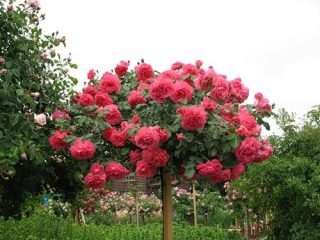Content
Rose Abraham Derby is a popular park variety of particular interest to gardeners and landscape designers. The hybrid plant is widely used for the decoration of personal plots. The flower is characterized by resistance to adverse environmental conditions. Therefore, it is often chosen for regions where it is impossible to grow other, less resistant varieties of roses.
Breeding history
The Abraham Derby variety was bred in 1965 in England. The breeder is the renowned British breeder David Austin. He has developed over 150 new ornamental varieties, most of which are actively cultivated by gardeners around the world.
Rose David Austin Abraham Derby - the result of interspecies crossing. The varieties Aloha and Yellow Cushion were used in breeding work.
The rose is named after the British metallurgist Abraham Derby III, who is famous for building the world's first cast-iron arch bridge. This facility is located near the breeding station where David Austin worked.
Description of the rose Abraham Derby and characteristics
The approach to plant classification varies. Some growers consider the Abraham Derby rose to be climbing. This is due to the fact that this category includes the Aloha variety, which was used in breeding work. In fact, the plant does not have long branching branches. Therefore, in most nurseries grow a bush rose Abraham Derby, which blooms on the shoots of the current year.
The variety belongs to the park. The plant is a medium-sized ornamental shrub. Height - from 60 cm to 1.5 m.Under favorable conditions, the bush reaches 2.5-3 m.
The plant is highly branched. The shoots are strong, with a lot of thorns. Late stems are prone to lignification. The bark is soft, dark green with a purple tint.
Superficial shoots are covered with dense foliage. The plates are ovoid, up to 8 cm long. Yellowish veins are clearly visible on the leaves.
During the flowering period, the rose is covered with large double flowers. They consist of 60-70 petals of various sizes. The shape of the buds is cup-shaped, the diameter reaches 12 cm. The color is pale pink with a yellow-peach core.
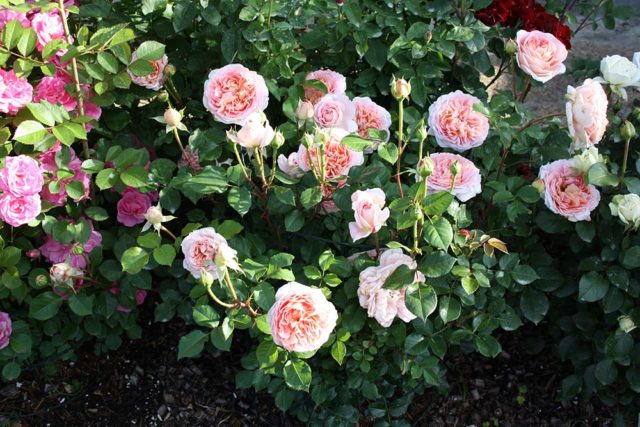
The Abraham Derby rose blooms in mid-June
The buds bloom once. Long bloom - until early September. Roses change throughout the summer. Therefore, flowering is not interrupted. The plant gives off a pleasant, persistent aroma.
The bushes are lush and vigorous. They lend themselves well to shaping. Shoot supports are used provided that their height exceeds 110 cm.
Abraham Derby roses are characterized by early flowering. When planting a seedling in the spring, it can bloom in the summer. The bush grows rather quickly.

Annual growth of shoots - up to 40 cm
The variety is characterized by high frost resistance. The plant tolerates temperatures down to -26 degrees. In central Russia and in the southern regions, a rose can be grown without shelter for the winter. Frost protection is required in Siberia and the Urals, where temperature indicators can drop below.
The Abraham Derby variety tolerates short-term drought normally. Prolonged lack of moisture has a detrimental effect on the condition of the bush.Buds and foliage wither and gradually crumble.
The rose is sensitive to waterlogging. Prolonged heavy rains and improper watering can seriously harm the bush. Excess moisture is the main cause of the development of diseases, especially black spot and powdery mildew.
Advantages and disadvantages of the variety
The hybrid English rose Abraham Darby has a wide range of positive characteristics and qualities. This explains its popularity among florists and landscape designers.
The advantages of the variety:
- compact size of the bush;
- unique color of buds;
- long flowering;
- frost resistance;
- pleasant aroma;
- good tolerance of pruning;
- low sensitivity to disease.
The described variety also has negative characteristics. They should be taken into account before planting a plant in your area.
Disadvantages:
- exacting care;
- deterioration of decorative qualities in adverse weather conditions;
- the possibility of damage by pests;
- sensitivity to lack of nutrients.
The Abraham Derby variety cannot be classified as one of the most resistant varieties. However, subject to agricultural technology, such a plant can be grown without the risk of wilting of the bush.
Reproduction methods
The hybrid rose variety Abraham Derby tolerates division well. Therefore, this option is most convenient for those who already have a similar plant. The bush is dug up, cleaned of the earth and cut into several parts. Each piece is put in a new place. This is the quickest and easiest way to grow another specimen in the garden.
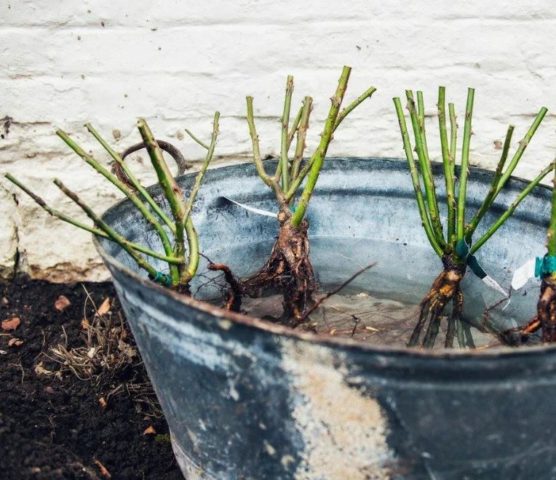
Shoots on the cut must be cut off, leaving 12-15 cm from the root collar
Another effective option is grafting. The separated rose shoots take root and adapt well to the nutrient soil. However, this process takes a long time.
Abraham Derby roses can be propagated by layering or offspring. However, these methods are more time consuming and better suited for experienced gardeners.
Growing and care
The English park rose is planted in autumn, in early September. The plant adapts better to the cold and tolerates the first winter normally. The next year, the young bush will begin to actively grow and bloom.
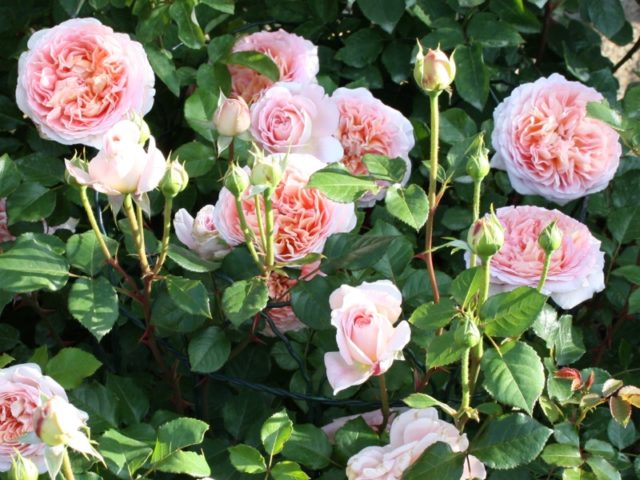
Rose Abraham Derby requires a spot with partial lighting
It is not recommended to plant a bush in the sun. Abundant light negatively affects the color of the buds and can provoke burns. The place must be protected from strong winds.
How to plant a bush:
- Dig a landing hole 60-70 cm deep.
- Prepare a soil mixture of sod land, river sand, compost and peat.
- Soak the roots of the seedling in water, then in an antiseptic solution for plants.
- Place a drainage layer of expanded clay, pebbles or broken brick at the bottom of the pit.
- Sprinkle with loose soil.
- Place a seedling with a depression of 5-6 cm.
- Spread out the roots and cover evenly with the potting soil.
At first, the bush needs to be given water once a week. In the middle of autumn, watering is stopped until spring.
Adult bushes need to be watered 1-2 times a week. For each use 12-15 liters of water.
As the soil is compacted, loosening is carried out. To retain moisture, the soil surface is mulched with bark, straw or sawdust.
Top dressing of roses is carried out 4-5 times a year. The first is carried out in April. Subsequent at intervals of 2-3 weeks during the budding period before flowering. After that, the rose is fed with superphosphate. Organic fertilizers are applied for the winter.
Sanitary pruning is required twice a year. If it is necessary to form a bush, shoots of 3-4 buds should be removed. The procedure is carried out after flowering.
Features of growing roses Abraham Derby are presented in the video.
Pests and diseases
The most common abraham derby rose diseases are black spot and powdery mildew. They arise due to waterlogging and violation of the irrigation regime.
For preventive purposes, the plant should be sprayed with soapy water. In the fall, in preparation for wintering, the bush is treated with copper sulfate.
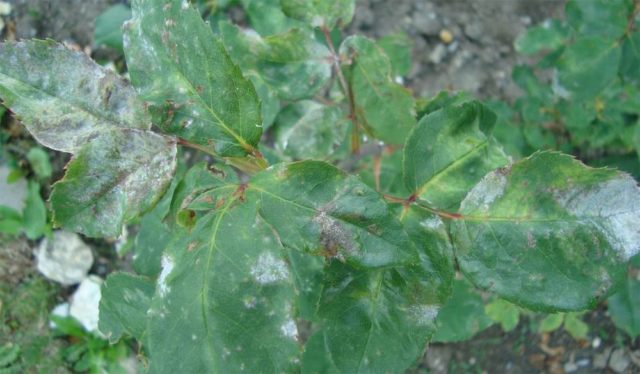
With powdery mildew, the affected shoots must be removed.
Preventive treatment with fungicides is carried out 2 times a year - before flowering and in autumn. This will protect the bush from fungi and bacteria.
Among the pests of the English park rose Abraham Derby are common:
- aphid;
- slobbering penny;
- sawfly;
- leaf rollers;
- rose cicadas;
- spider mites.
The most effective insect control method is insecticide treatment. It is carried out 2-3 times with an interval of 3-7 days, depending on the properties of the drug.
Application in landscape design
The Abraham Derby rose can be grown as a scrub rose, and as a climbing rose - with a garter to the trellises. The plant is used for single planting or in a group. The variety goes well with other types of roses, as well as tall flowering shrubs.
Abraham Derby is often used in mixborders. They are placed in the background. Herbaceous low-growing plants with early flowering are planted in front. The abundant foliage of roses acts as a background for them.
The Abraham Derby variety is not recommended to be planted next to crops that are demanding on the composition of the soil. They should be grown near unpretentious plants. It is imperative to maintain a distance when planting next to climbing vines.
Conclusion
Rose Abraham Derby is a hybrid variety that has earned popularity among gardeners and designers. The plant is appreciated for its unique decorative qualities, long flowering, frost resistance. Despite a number of advantages, the Abraham Derby rose cannot be called unpretentious. For the successful cultivation of such a flower, you must follow the rules of planting and care.
